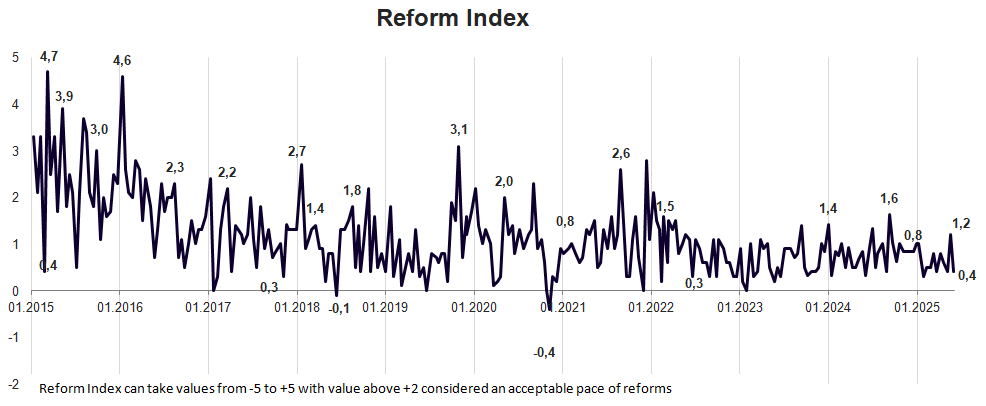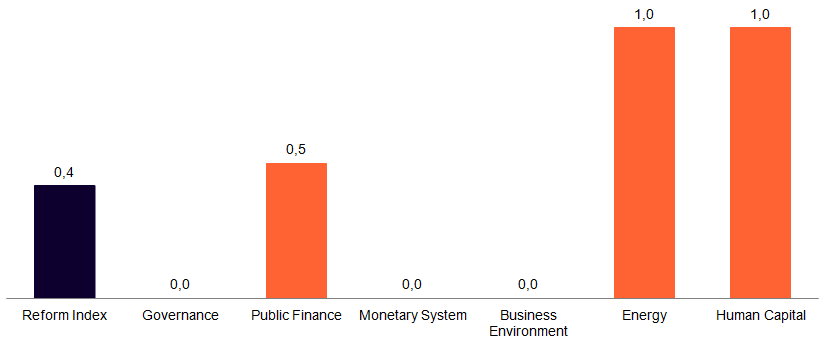Between May 18 and June 1, the Reform Index experts recorded only three reforms. Two of them received a score of +1 (on a scale from -5 to +5). These were government resolutions introducing new procedures for crisis response in the oil market and simplifying the process of granting subsidies to large and foster families. Another measure received a score of +0.5 — a resolution regulating the use of material assets from the state reserve. The Reform Index score for Issue 265 is 0.4 points (ranging from -5 to +5). In the previous period, the Index stood at 1.2 points.
Graph 1. Dynamics of the Reform Index

Graph 2. Values of the Reform Index and its Components in the Current Assessment Round

Crisis response plan for the oil market, +1 point
The Cabinet of Ministers has developed a plan outlining how the state will act in the event of an oil or fuel shortage. The plan defines two levels of crisis in the oil market: a warning level (when reserves cover fewer than 14 but more than 7 days) and an emergency level (when reserves fall below 7 days). At the warning level, the government enhances monitoring and issues recommendations to businesses to increase fuel reserves, extraction, refining, and imports, while also informing the public about potential supply restrictions. If the situation deteriorates, the government activates the emergency level. In this case, the state may impose export quotas or ban exports entirely, restrict fuel sales at filling stations, regulate transportation and organizational activities, and seek assistance from international partners.
Information about the Reforms Index project, the list of Index experts and the database of the regulations assessed are available here.
Expert commentary
Roman Nitsovych, Research Director, DiXi Group
“The plan outlines a response algorithm for managing various levels of crisis in the fuel market through the use of minimum oil and petroleum product stocks (MOPPS). It is one of the final regulatory acts required to operationalize Law No. 3484-IX on Minimum Oil and Petroleum Product Stocks, which came into force on December 24, 2024.
Earlier, procedures were adopted for the creation, management, and operation of the MOPPS system, as well as for the functioning and maintenance of the electronic reporting system (operational since February 2025 under JSC Market Operator), monitoring of the oil, petroleum product, and liquefied gas markets, and oversight of petroleum product quality and safety.
The only remaining step is to develop and approve a methodology for calculating the level of minimum oil and petroleum product stocks. This task is included in the Ministry of Energy’s plans for the current year.”
Simplified subsidy access for foster and large families, +1 point
The Cabinet of Ministers has eased access to subsidies for certain socially vulnerable groups — including family-type orphanages, foster families, large families (with three or more children), and internally displaced persons (IDPs).
From now on, family-type orphanages, foster families, and large families (with three or more children) will not lose eligibility for subsidies due to purchasing housing or land, holding savings deposits, or making documented expenditures on children’s needs (such as clothing, food, or appliances). In addition, the allowable level of utility debt has been increased from UAH 680 to UAH 4,000. This means that households with such debt may still qualify for subsidies. Moreover, when assessing eligibility, the incomes of individuals registered at the address but not actually part of the household (i.e., not listed in the declaration) will not be taken into account. If multiple family-type orphanages reside at the same property, each will now be eligible for a separate subsidy.
Expert commentary
Inna Studennikova, Center of Public Finance and Governance, Kyiv School of Economics
“The government has simplified the procedure for obtaining housing subsidies for family-type orphanages and foster families, notably allowing them to exclude child-related expenses from the subsidy eligibility assessment. This reduces bureaucratic barriers and makes support more accessible — a crucial step toward preventing the institutionalization of children and strengthening family-based care.”
Reform Index from VoxUkraine aims to provide a comprehensive assessment of reform efforts by Ukraine’s authorities. The Index is based on expert assessments of changes in the regulatory environment in six areas: Governance, Public Finance, Monetary system, Business Environment, Energy, Human Capital. Information about the Reforms Index project, the list of Index experts and the database of the regulations assessed are available here.
Attention
The author doesn`t work for, consult to, own shares in or receive funding from any company or organization that would benefit from this article, and have no relevant affiliations



